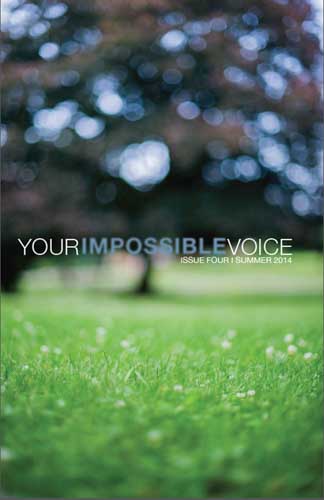Your Impossible Voice – Summer 2014
Your Impossible Voice, a newer quarterly e-publication, has taken strides to give a great literary experience through the professional and engaging look of their website to the well-formatted work of their publication. As far as the work goes? Well, let’s explore. Karen An-hwei Lee’s “Letter from Orange County: Twelve Fragments” falls under the category of nonfiction in this issue, and is a beautifully written homage to a past place, or rather to a current place that is no longer what it was, but I could argue that it could also fall under the category of poetry with lines like these…
Your Impossible Voice, a newer quarterly e-publication, has taken strides to give a great literary experience through the professional and engaging look of their website to the well-formatted work of their publication. As far as the work goes? Well, let’s explore.
Karen An-hwei Lee’s “Letter from Orange County: Twelve Fragments” falls under the category of nonfiction in this issue, and is a beautifully written homage to a past place, or rather to a current place that is no longer what it was, but I could argue that it could also fall under the category of poetry with lines like these:
For the last orange tree, a masquerade of a dozen myths—
On the corner of Iglesia Oasis de Gloria, out of a coastal mesa where the
freeway ends at a beach city, in a soft albedo of hidden southern California
suns, the tiniest of those suns, the unskinned pulp before we said tangelo or clementine or even oroblanco for grapefruit, hybrid of a sweet orange and a pomelo—the low movement of light in the morning—a waking dream of invisible oranges razed long ago on a boulevard of ginger-washed light. Please do not say orchard yet.
Each sentence of her piece is a treat for the mouth and something for the brain to consider about changing landscape. If you read anything in this issue, let this be it.
And while An-hwei Lee’s piece could easily be poetry, John Beckman’s piece is so carefully constructed that I could believe it to be nonfiction rather than fiction, if I didn’t know better. About a young girl’s struggle with her beliefs and her mother’s cancer, “La Femme Visible” feels honest:
“Justine, I have to tell you something. These days my body glows less and less. These days my body isn’t holy [saint].”
Here is in fact what my mother had said:
“These days my body isn’t healthy [sain].”
Saint and sain are homonyms; the terminal consonants are silent in both. To make matters worse, she went on to say:
“Your whole body glows with life! It is healthy (sain), it is holy (saint), it’s an instrument of God, it’s a healthy [holy?] instrument of God!”
I asked her bluntly if she had sinned.
My question surprised her. “Everyone has sinned.”
Why was my body holy when hers was not?
Reading David Bajo’s “Equisa” is stepping into a new world where reading is no longer about words but is about drinking a special tea and experiencing the story by looking at placards (how was a little unclear to me), paying someone is as easy as typing a couple things into a phone, and trying to obtain paper books is a crime that can result in being stripped of your clothes and hair (don’t try hiding a piece of paper!) and strangled. I was instantly interested in Equisa immediately and what the book she tries to find is, and its significance. I was left slightly unsatisfied at the end, however, as it felt like a chapter stolen from the middle of a book (perhaps it is? There is no indication.), and I wanted to know what more happened.
Though overall, the poetry was less impressive than the prose to me (where I spent most of my time), I was still glad I read it. Your Impossible Voice holds promise for issues still to come.
[www.yourimpossiblevoice.com]






